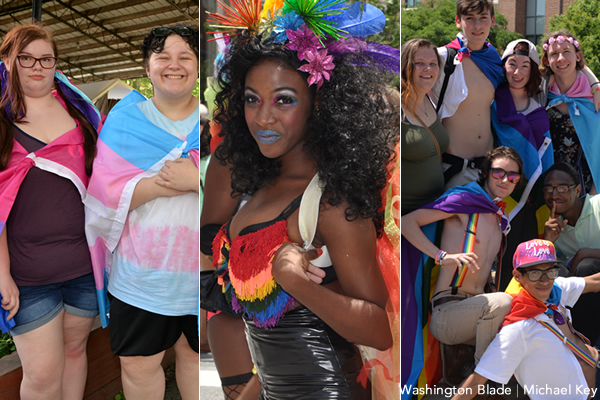a&e features
Towns within a few hours’ drive of D.C. have major Pride events planned
Baltimore is this weekend; Annapolis, HOCO, MOCO, Panhandle et. al. later in the month
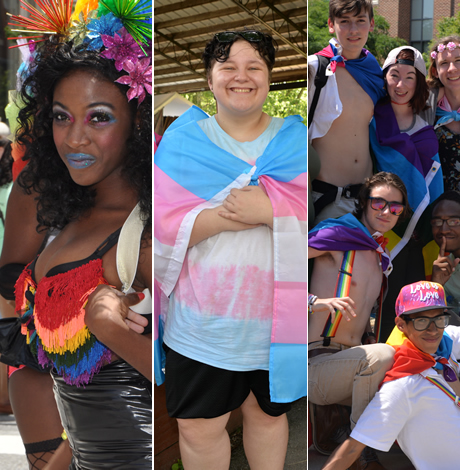
HAMPTON ROADS PRIDE
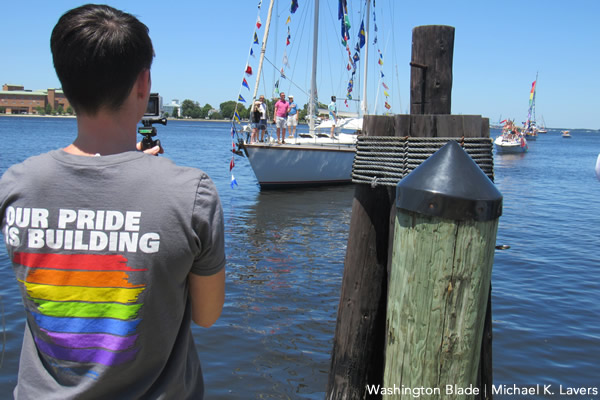
A woman takes pictures of boats in Hampton Roads Pride’s annual Pride Boat Parade on the Elizabeth River in Norfolk, Va. (Washington Blade photo by Michael K. Lavers)
Hampton Roads Pride presents various celebration events throughout June 16-23.
Drag Yourself to Brunch: Pride Edition is at Croc’s 19th Street Bistro (620 19th St., Virginia Beach, Va.) on Sunday, June 16 from 10:30 a.m.-4:30 p.m. Sandra Onassis Lopez and other local drag perfumers will have shows at 11 a.m. and 2 p.m. There will be raffles sold all day and the drawing will be at 3:50 p.m. after the 2 p.m. show. Guests are asked to arrive 30 minutes before each show. Visit, dragyourselftobrunch.com for reservations.
PraiseFest 2019 is at the Great Awakening United Church of Chris (1520 High St., Portsmouth, Va.) on Sunday, June 16 from 2-4 p.m. Attendees can enjoy an afternoon of gospel music, dance, mime and spoken word.
Ghent Business Association and Hampton Roads Pride host Ghent Pride at the Palace Shops & Station (301 W 21st St., Norfolk, Va.) on Monday, June 17 from 6-10 p.m. The party will take place in the parking lot between 21st and 22nd Street. There will be music, beer, wine, signature cocktails and food from local restaurants. Attendees can purchase a “Love Lock” to put on the “Love is Love” display. Cover is $10. All proceeds will benefit the Ghent Business Association, Hampton Roads Pride and the LGBT Life Center.
Pride Party on the Peninsula, a river boat cruise with drag performers, kicks off at Carousel Park (601 Settlers Landing Rd., Hampton, Va.) on Wednesday, June 19 from 3:30-10 p.m. Guests will take a cruise on the Miss Hampton II with Jennifer Warner and other performers. Emcee Queen Mary and Dianna Rhoss will host the party. There will be complimentary hors d’oeuvres from local Hampton restaurants, a DJ, raffle contest, cash bar and a complimentary drink ticket for the first 300 guests. Tickets are $10. All proceeds benefit the LGBT Life Center.
Pride at the Chrysler is at the Chrysler Museum of Art (1 Memorial Pl., Norfolk, Va.) on Thursday, June 20 from 6-9 p.m. Activities include make-and-take art, a build-your-own-tour of LGBT artists’ work at the museum and face painting. Drag queen Sandra Onassis Lopez will perform. Event is free. Open to all ages. Guests must be 21 to drink.
Hampton Roads Pride’s Eighth Annual Block Party is on Friday, June 21 from 7-11:55 p.m. This year’s theme is “Strike a Pose.” There will be dancing, drag performances, live art and magical performers. DJ Rays will spin tracks. Tickets are $13 before June 17 and $16 afterwards. All proceeds will benefit Hampton Roads Pride.
PrideFest 2019, the largest LGBT festival is Virginia, is at Town Point Park (113 Waterside Dr., Norfolk, Va.) on Saturday, June 23 from noon-8 p.m. Pop star JoJo and house singer Crystal Waters headline the event. The only Pride Boat Parade in the United States will also take place. Angela Hucles, two-time Olympic gold medalist with USA Women’s Soccer, will serve as grand marshal. There will be entertainment, vendors and activities for all ages. Admission is free.
PrideFest After Party is at Waterside District (333 Waterside Dr., Norfolk, Va.) on Saturday, June 22 from 6 p.m.-1:30 a.m. There will be drink specials from 6-9 p.m. Admission is free. Tickets are not required but Waterside District will donate $5 to Hampton Roads Pride on behalf of the first 500 guests who scan their ticket.
Pride on the Beach is at Neptune’s Park (3001 Atlantic Ave., Virginia Beach, Va.) on Sunday, June 23 from 2-7 p.m. The white-themed party will feature white linen, fabrics, couches and lounge beds. Dress code of white beachwear is strongly encouraged. DJ Tezrah will play music. Admission is free and open to all ages.
For details on all Hampton Roads Pride events, visit hamptonroadspride.org.
— MARIAH COOPER
ANNAPOLIS PRIDE
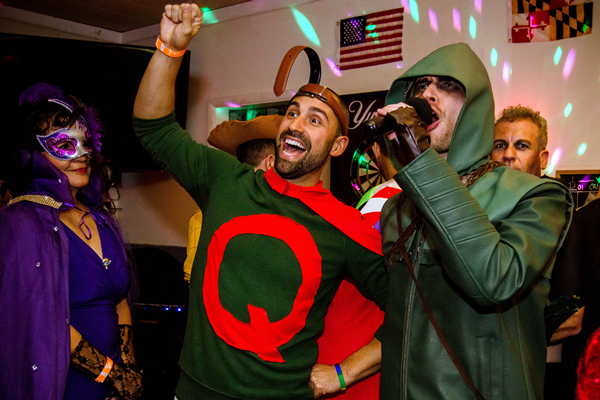
Annapolis Pride held a Halloween Party fundraiser for this year’s inaugural Pride Parade and Festival. (Photo by Fleur de Lis Photography)
Annapolis will celebrate its inaugural Pride Parade and Festival on Saturday, June 29. The event is free and open to the public.
The organizer, also called Annapolis Pride, is looking forward to a family-friendly event that celebrates LGBT people while engaging local residents, businesses and groups to unite in welcoming and embracing diversity in Maryland’s capital.
The parade will run from noon-12:45 p.m. down West Street from Amos Garrett Blvd. to Calvert, while the festival is from noon-5 p.m. between Calvert street and Church Circle. The festival will include vendors, children’s activities and entertainment from local artists and DJs.
Details at annapolispride.org.
— PHILIP VAN SLOOTEN
FREDERICK PRIDE
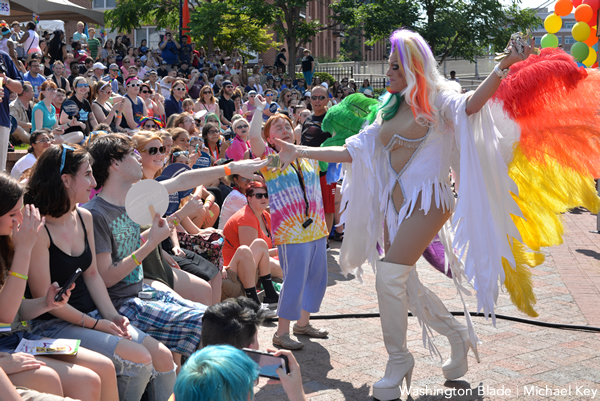
Frederick Pride (Washington Blade photo by Michael Key)
Frederick Pride is Saturday, June 22 from 11 a.m.- 6 p.m. at Carroll Creek Linear Park in downtown Frederick, Md.
This will be Frederick Pride’s eighth year and organizers are expecting up to 8,000 attendees. Every attendee will receive a Frederick Pride rainbow bracelet at welcome stations at each major entrance to the park. Admittance is free and families and allies are welcome.
There will be two entertainment areas featuring bands, drag shows, DJs and dancing at the Carroll Street Amphitheater and the Market Street venue. Younger kids can enjoy organized youth group activities at the East Street stage. A food court will be above the amphitheater with beer and wine available next to it.
Official Pride paraphernalia will be available for purchase at the Frederick Center booth and all proceeds will go toward supporting programs at local LGBTQ centers. For more information, visit frederickpride.com.
— YULANI RODGERS
HOWARD COUNTY PRIDE
Howard County, Md., will host its first Pride celebration Saturday, June 29, from 11 a.m.-5 p.m. at Centennial Park in Elliott City, Md. The event is free and open to the public.
Howard County’s PFLAG chapter is leading plans for the festival, which is set to coincide with the 50th anniversary of the 1969 Stonewall uprising in New York and has a theme of “Remember, Resist and Rejoice.”
For more information visit howardcountypride.org.
— PHILIP VAN SLOOTEN
MONTGOMERY COUNTY PRIDE
Montgomery County, Md., will host its first Pride Party 2019 on Saturday, June 29 at Rockville Town Square (200 E. Middle Ln.) from 6:30-10:30 p.m.
The night will celebrate the 50th anniversary of the Stonewall Riots and will include performances from Miss Peppermint, who was featured on season nine of “Rupual’s Drag Race,” BOOMscat, DJ tezrah, Shaunda Leer and Pretty Boi Drag. All proceeds will benefit the MoCo Pride Center and early bird tickets start at $7.50. For more information, search “MoCo Pride Party” on Facebook.
— YULANI RODGERS
WINCHESTER PRIDE
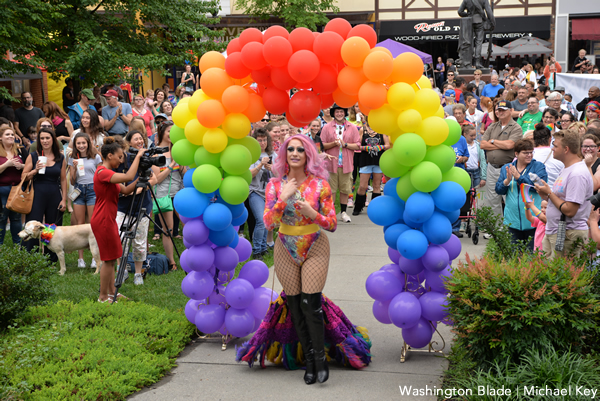
Winchester Pride (Washington Blade photo by Michael Key)
Winchester Pride will be Saturday, June 29 at the Old Court House at the Downtown Walking Mall (S Loudoun St., Winchester, Va.) and kicks off at noon.
The second annual Winchester Pride will have guest speakers, a family-friendly drag show, vendors and non-profit organizations to celebrate. Speakers include John “David” Smith, mayor of Winchester; Jennifer Wexton, representative from the 10th district of Virginia; a conversion therapy survivor and more. DJ Skyhigh will host and provide all the music for the event. The new 2019 Miss Winchester Pride will also be introduced after being crowned at the Bright Box prior.
For more information, visit winchesterpridecelebration.com
— YULANI RODGERS
BALTIMORE PRIDE
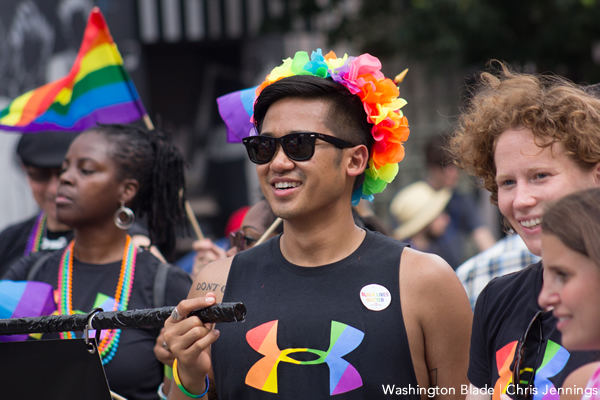
Baltimore Pride (Washington Blade photo by Chris Jennings)
The Pride Center of Baltimore is celebrating its annual parade and festival, now in its 44th year, June 15-26. Last year about 30,000 attended the events.
The year’s theme is “Unity through Diversity: The Remix” and organizers say it signifies the “transformation of fears into empowerment while embracing community in a fight for justice and the right to live authentically.”
The Pride Center’s board of directors recognize the difficulties faced by the transgender community this year, stating on their website, “We will not stand with those who attempt to divide, demean or threaten (our) values.”
Official Pride events directly benefit the center and will help fund more than 40 programs that serve around 800 sexual and gender minority individuals every month in Baltimore.
The center’s annual benefit evening Twilight on the Terrace is tonight at Gertrude’s at the Baltimore Museum of Art Sculpture Garden from 7-11 p.m. Each year the event provides attendees with a night of food, fun and socialization to mark the commencement of Baltimore Pride weekend. Guests can dance, eat and drink craft cocktails from Gertrude’s and Hendrick’s Gin.
This year’s entertainment features a special performance by opera singer Carmelita B. featuring Septimius the Great. Attendees will also have the opportunity to participate in a silent auction to bid on several Am Fund-sponsored vacation packages. Tickets are $125 on Eventbrite.
The Rainbow Lot, the official Pride tailgating party, will be open from 11 a.m.-8:30 p.m. behind Graffiti Alley (1915 N. Howard St.). Food trucks such as Jurassic Pork and Kona Ice will be stationed. The cost is $25 for one space for one car with two people, or for one tailgating tent space. There is a $5 fee for each additional person. Tickets are on Eventbrite.
The Pride Parade is Saturday, June 15 from 1-3 p.m. The parade begins at N. Charles and 33rd streets next to Wyman Park, proceeds 11 blocks and ends at N. Charles and 23rd St. There is a viewing stage on the corner of N. Charles St. and 24th St. in the Brown Rice Parking Lot.
Following the parade, the Pride Block Party begins at 4 p.m. at Station North, with a pre-show at 1:30 p.m. featuring local artists and a DJ dance stage at 22nd and N. Charles. Also, for the first time, Pride will host a mini Pet Parade beginning at 1 p.m. between 24th-25th and N. Charles.
The parade will also feature a high-heel race where contestants can compete in heels at least two inches high. The fun begins at 12:30 p.m. at 25th and N. Charles.
The Pride Festival is Sunday, June 16 from noon-6 p.m. in Druid Hill Park (between Swann Drive and Sundial Pavilion). The festival will celebrate families and children with a kid-friendly atmosphere including music and entertainment stages, a Drag Stage, exhibitors and local food trucks.
For more information visit baltimorepride.org.
— PHILIP VAN SLOOTEN
PANHANDLE PRIDE
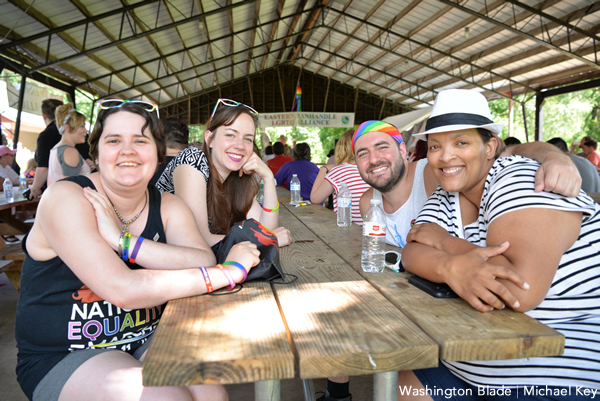
Panhandle Pride (Washington Blade photo by Michael Key)
Like tiny Shepherdstown, W.Va., that hosts it, Panhandle Pride makes up for in character what it lacks in size. And it’s growing each year. This year’s theme is Be. Scene. Here. It’s the region’s seventh annual event, second under new leadership.
This year’s events kick off with a Pride pub crawl on Friday, June 28 starting at 5 p.m.
An interfaith service dubbed “Celebrating Our Stories” will be held at Shepherdstown Presbyterian Church (100 W. Washington St.) on Saturday, June 29 at 10 a.m.
A vendor street fair with artisans, non-profits and poetry walk is also Saturday from 11 a.m.-4 p.m. in downtown Shepherdstown.
A dance party and drag show will be held that night from 8 p.m.-midnight at the War Memorial Building (102 E. German St., Shepherdstown).
Details at eppridewv.com.
Quite close to here but in Maryland, Hagerstown Hopes Pride event is planned for the weekend of July 13. The Blade will have more next month.
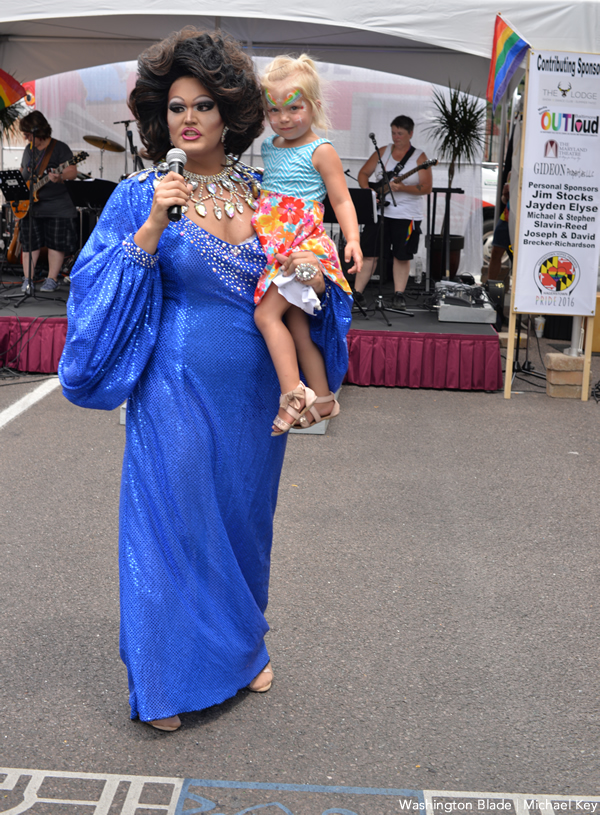
Hagerstown Pride (Washington Blade photo by Michael Key)
a&e features
Queer highlights of the 2026 Critics Choice Awards: Aunt Gladys, that ‘Heated Rivalry’ shoutout and more
Amy Madigan’s win in the supporting actress category puts her in serious contention to win the Oscar for ‘Weapons’
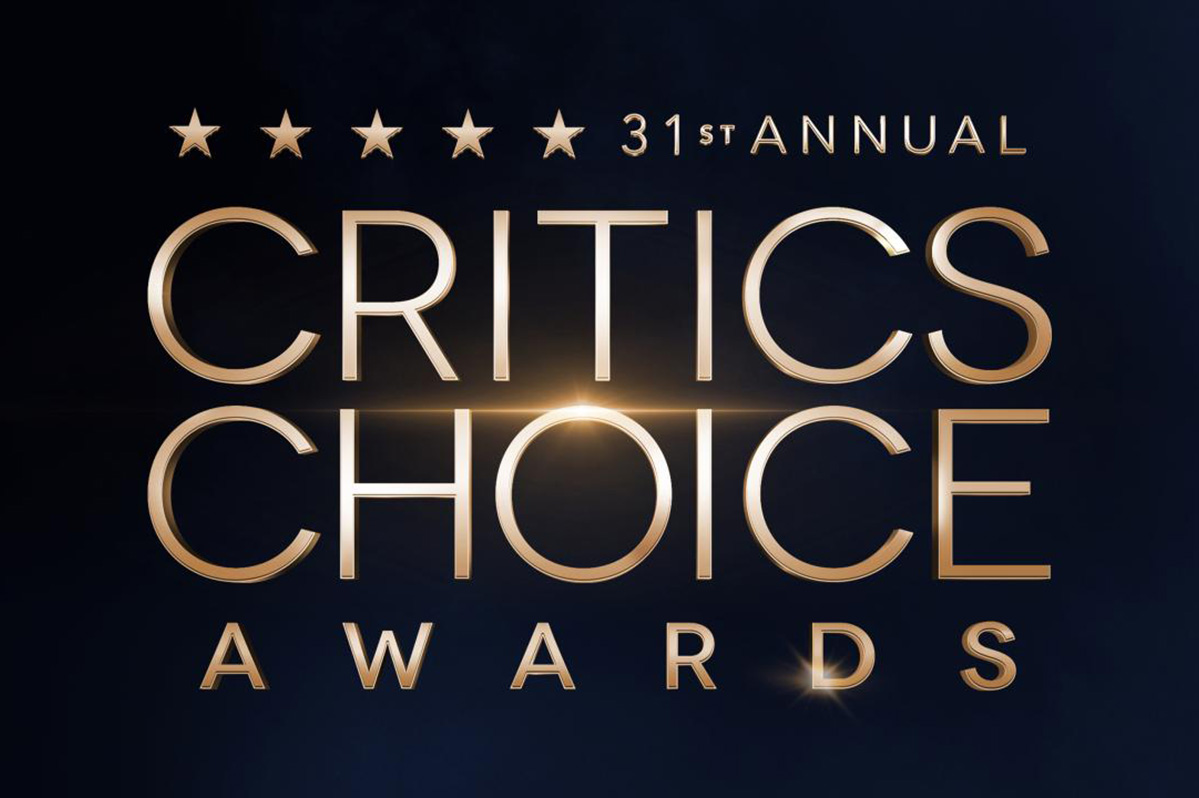
From Chelsea Handler shouting out Heated Rivalry in her opening monologue to Amy Madigan proving that horror performances can (and should) be taken seriously, the Critics Choice Awards provided plenty of iconic moments for queer movie fans to celebrate on the long road to Oscar night.
Handler kicked off the ceremony by recapping the biggest moments in pop culture last year, from Wicked: For Good to Sinners. She also made room to joke about the surprise hit TV sensation on everyone’s minds: “Shoutout to Heated Rivalry. Everyone loves it! Gay men love it, women love it, straight men who say they aren’t gay but work out at Equinox love it!”
The back-to-back wins for Jacob Elordi in Frankenstein and Amy Madigan in Weapons are notable, given the horror bias that awards voters typically have. Aunt Gladys instantly became a pop culture phenomenon within the LGBTQ+ community when Zach Cregger’s hit horror comedy released in August, but the thought that Madigan could be a serious awards contender for such a fun, out-there performance seemed improbable to most months ago. Now, considering the sheer amount of critics’ attention she’s received over the past month, there’s no denying she’s in the running for the Oscar.
“I really wasn’t expecting all of this because I thought people would like the movie, and I thought people would dig Gladys, but you love Gladys! I mean, it’s crazy,” Madigan said during her acceptance speech. “I get [sent] makeup tutorials and paintings. I even got one weird thing about how she’s a sex icon also, which I didn’t go too deep into that one.”
Over on the TV side, Rhea Seehorn won in the incredibly competitive best actress in a drama series category for her acclaimed performance as Carol in Pluribus, beating out the likes of Emmy winner Britt Lower for Severance, Carrie Coon for The White Lotus, and Bella Ramsey for The Last of Us. Pluribus, which was created by Breaking Bad’s showrunner Vince Gilligan, has been celebrated by audiences for its rich exploration of queer trauma and conversion therapy.
Jean Smart was Hack’s only win of the night, as Hannah Einbinder couldn’t repeat her Emmy victory in the supporting actress in a comedy series category against Janelle James, who nabbed a trophy for Abbott Elementary. Hacks lost the best comedy series award to The Studio, as it did at the Emmys in September. And in the limited series category, Erin Doherty repeated her Emmy success in supporting actress, joining in yet another Adolescence awards sweep.
As Oscar fans speculate on what these Critics Choice wins mean for future ceremonies, we have next week’s Golden Globes ceremony to look forward to on Jan. 11.
a&e features
Looking back at the 10 biggest A&E stories of 2025
‘Wicked,’ Lady Gaga’s new era, ‘Sexy’ Bailey and more
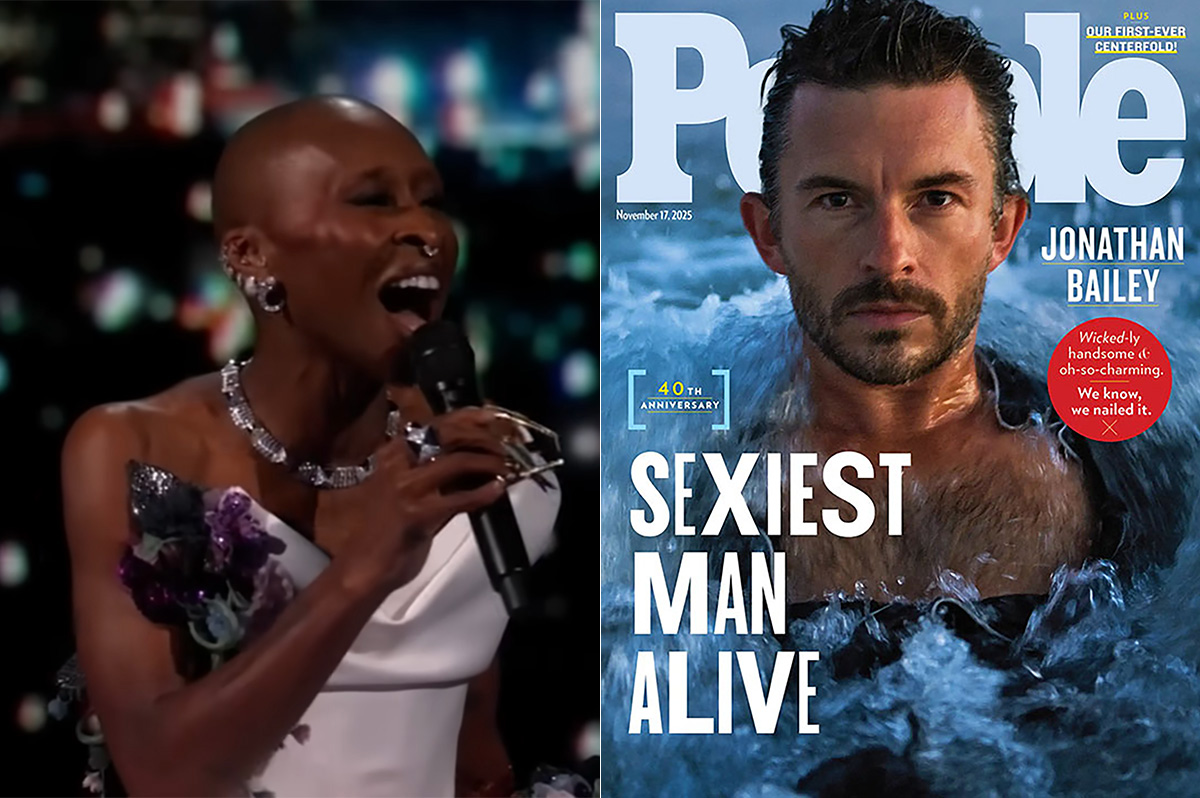
Although 2025 was a year marked by countless attacks on trans rights and political setbacks, the year also saw brilliant queer artists continuing to create art. From Cannes and Sundance Award winners now vying for Oscar consideration to pop icons entering new stages of their careers, queer people persevered to tell their stories through different media.
With the state of the world so uncertain, perhaps there’s no more vital time to celebrate our wins, as seen through some of this year’s top pop culture moments. While there’s no collection of 10 stories that fully encompass “the most important” news, here are some events that got the gays going:
10. ‘Mysterious Gaze of the Flamingo’ wins big at Cannes
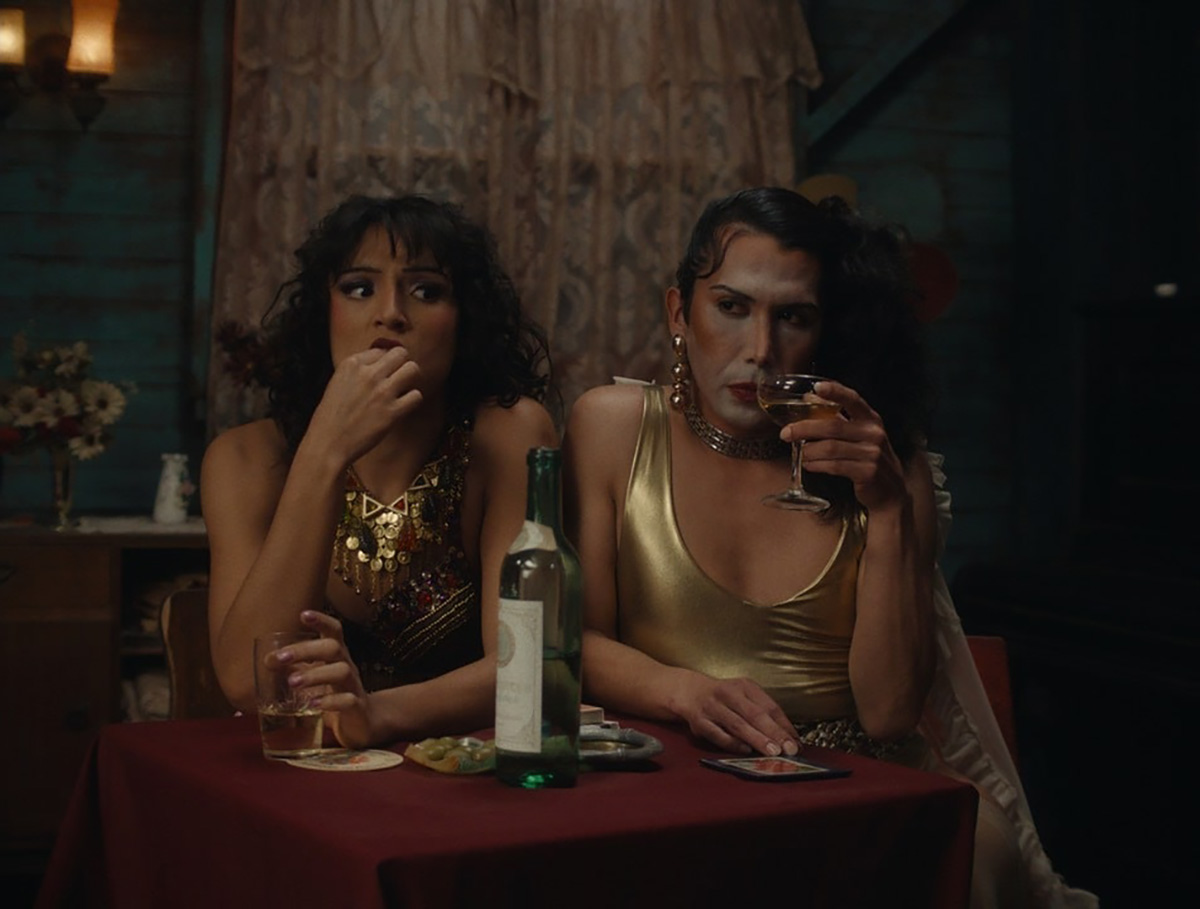
The Cannes Film Festival has become a crucial start for films hoping to make their way to the Oscars, and first-time director Diego Céspedes won the top Un Certain Regard prize for his intimate western “The Mysterious Gaze of the Flamingo.” The film is set in the ‘80s and is intended as an allegory for the AIDS epidemic. Seeing a film that unpacks vital queer history win one of the most coveted awards at Cannes has been a huge point of pride in the independent filmmaking community.
Since the film bowed at Cannes, it has been selected as Chile’s Oscar entry in the Best International Feature race. Speaking with The Blade during the film’s AFI Fest run in October, Céspedes said: At first, I was kind of scared to have this campaign position in the times that we’re living [in] here. But at the same time, I think the Oscars mean a huge platform — a huge platform for art and politics.”
9. ‘The Last of Us’ returns for an even gayer season 2
While the first season of The Last of Us gave us one of TV’s most heartbreaking queer love stories in the episode “Long, Long Time,” Season 2 doubled down on its commitment to queer storytelling with the blossoming relationship between Ellie (Bella Ramsey) and Dina (Isabela Merced). The show expanded on the pair’s relationship in the original video game, making it perhaps the central dynamic to the entire season. That unfortunately came with more homophobic backlash on the internet, but those who checked out all the episodes saw a tender relationship form amid the show’s post-apocalyptic, often violent backdrop. For their performance, Ramsey was once again nominated for an Emmy, but Merced deserved just as much awards attention.
8. ‘Emilia Pérez’ sparks controversy
Jacques Audiard’s genre-bending trans musical “Emilia Pérez” proved to be an awards season juggernaut this time last year, winning the Golden Globe for Best Musical/Comedy. But when the lead star Karla Sofia Gascón’s racist, sexist, and homophobic old tweets resurfaced, the film’s Oscar campaign became a tough sell, especially after Netflix had tried so hard to sell Emilia Pérez as the “progressive” film to vote for. Mind you, the film had already received significant backlash from LGBTQ+ audiences and the Mexican community for its stereotypical and reductive portrayals, but the Gascón controversy made what was originally just social media backlash impossible to ignore. The only person who seemed to come out of the whole debacle unscathed was Zoe Saldaña, who won the Oscar for Best Supporting Actress over Ariana Grande.
7. ‘Sorry, Baby’ establishes Eva Victor as major talent
Back in January at the Sundance Film Festival, Eva Victor (known by many for her brand of sketch comedy) premiered their directorial debut “Sorry, Baby” to rave reviews, even winning the Waldo Salt Screening Award. Victor shadowed Jane Schoenbrun on the set of “I Saw the TV Glow,” and seeing Victor come into their own and establish such a strong voice immediately made them one of independent cinema’s most exciting new voices. A memorable scene in the film sees the main character, Agnes (played by Victor), struggling to check a box for male or female, just one example of how naturally queerness is woven into the fabric of the story.
Most recently, Victor was nominated for a Golden Globe for her performance in the film, and she’s represented in a category alongside Jennifer Lawrence (“Die My Love”), Jessie Buckley (“Hamnet”), Julia Roberts (“After the Hunt”), Renate Reinsve (“Sentimental Value”) and Tessa Thompson (“Hedda”). The film also received four Independent Spirit Award nominations overall.
6. Paul Reubens comes out in posthumous doc
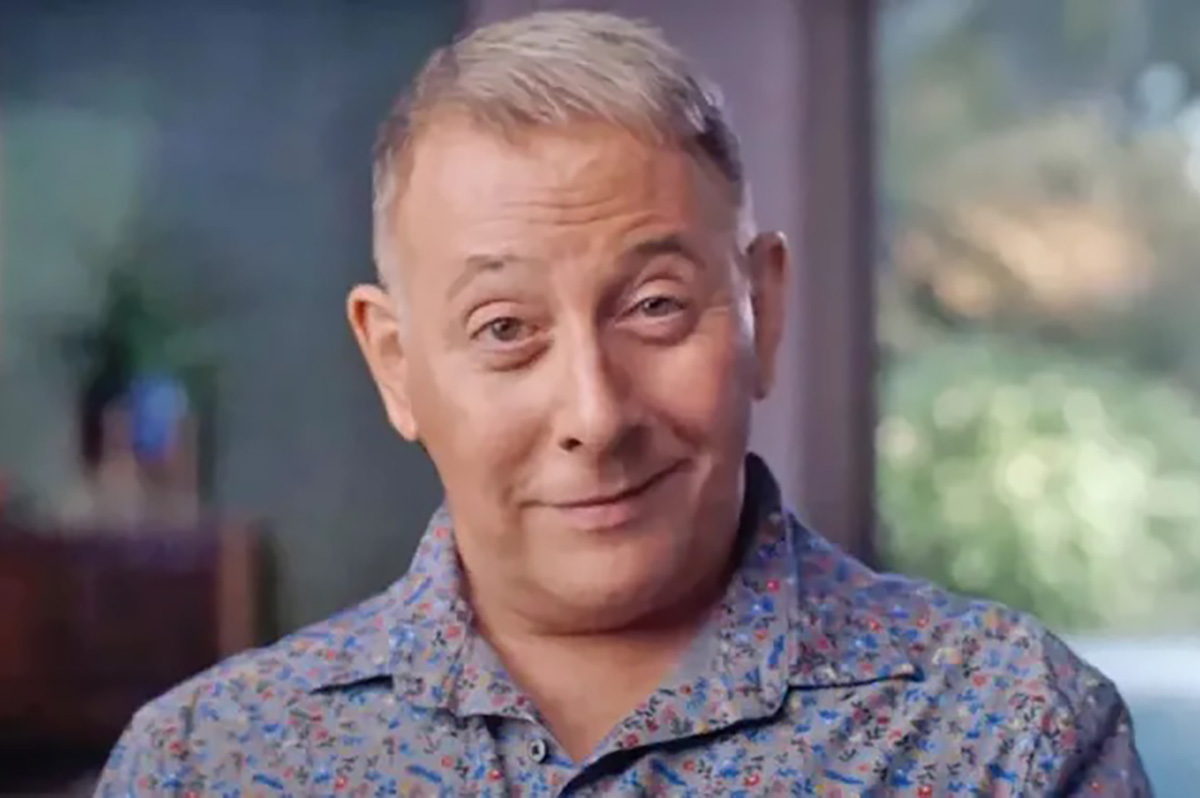
While Paul Reubens never publicly came out as gay before passing away in 2023, the two-part documentary “Pee-wee as Himself” premiered back in May on HBO Max, giving the legendary comedian a chance to posthumously open up to the world. Directed by Matt Wolf, the documentary explores how Reubens found his alter ego Pee-Wee Herman and why he kept his private life private.
The documentary won an Emmy in the Outstanding Documentary or Nonfiction Special category and remains one of the most critically acclaimed titles of the year with a 100% Rotten Tomatoes score. Also worth noting, the National Geographic documentary Sally told the posthumous coming out story of Sally Ride through the help of her long-time partner, Tam O’Shaughnessy.
5. Lady Gaga releases ‘Mayhem’
Lady Gaga entered a new phase of her musical career with the release of Mayhem, her seventh album to date. From the frenzy-inducing pop hit Abracadabra to the memorable Bruno Mars duet featured on “Die With a Smile,” seeing Gaga return to her roots and make an album for the most die-hard of fans was especially rewarding after the underwhelming film releases of “House of Gucci” and “Joker: Folie à Deux.” Gaga has been touring with The Mayhem Ball since July, her first arena tour since 2018. She even extended her tour into 2026 with more North American dates, so the party isn’t stopping anytime soon. And Gaga is even set to make an appearance next May in “The Devil Wears Prada 2.”
4. Cynthia Erivo, Ariana Grande perform at the Oscars
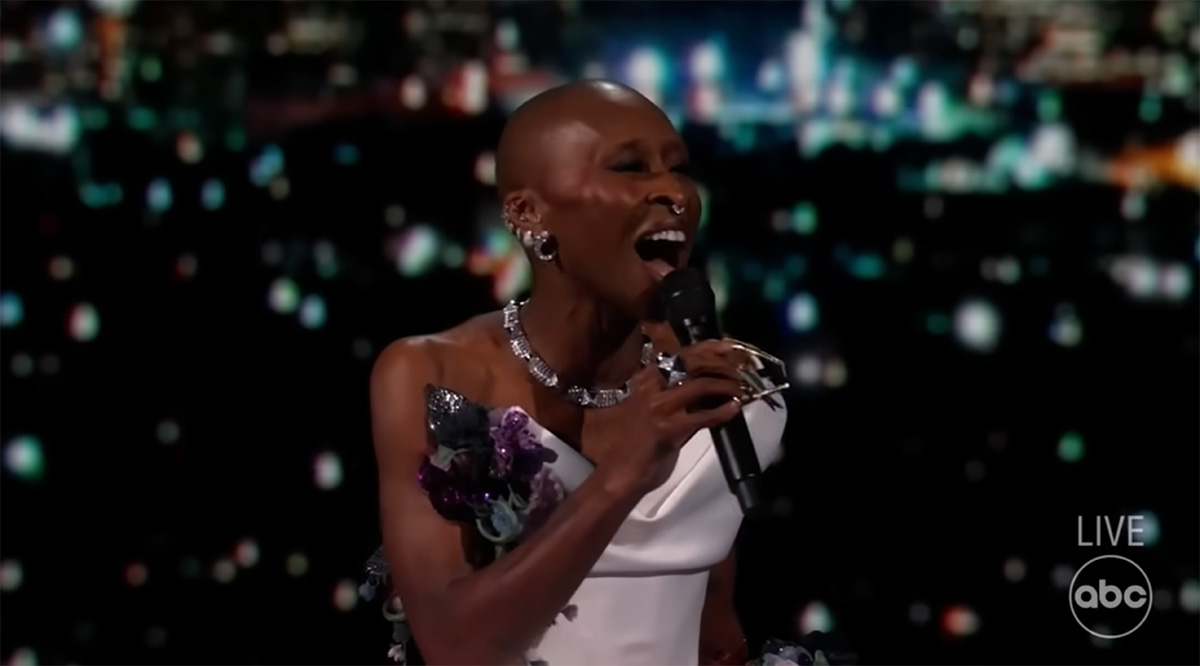
While “Wicked: For Good” didn’t quite reach the heights of the first film, we will forever have Cynthia Erivo and Ariana Grande’s breathtaking live performance that opened the 97th Academy Awards. The pair sang a rendition of “Over the Rainbow,” “Home,” and “Defying Gravity,” paying proper homage to the original 1939 “Wizard of Oz.” Even non-Wicked fans can’t deny how magical and brilliantly staged this performance was. With both Erivo and Grande up for acting Oscars last year, they’re hoping to repeat success and make history with consecutive nominations. Either way, let’s hope there’s another live performance in the making, especially with two new original songs (The Girl in the Bubble and No Place Like Home) in the mix.
3. Indya Moore speaks out against Ryan Murphy
Indya Moore has consistently used social media as a platform for activism, and in September, posted a 30-minute Instagram live speaking out against “Pose” co-creator Ryan Murphy. Moore claimed that Murphy wasn’t being a true activist for trans people. “Ryan Murphy, we need you to do more. You need to address the racism, the violence, and the targeting of people on your productions, Ryan Murphy. You do need to make sure trans people are paid equally. Yes, Janet did the right thing,” Moore said. Murphy was also back in the headlines this year for the critically panned “All’s Fair” and the controversial “Monster: The Ed Gein Story” starring Laurie Metcalf and Charlie Hunnam.
2. Cole Escola wins Tony for Best Leading Actor
Few pop culture moments this year brought us together more than Cole Escola winning a Tony award for “Oh, Mary!” the Broadway show they created, wrote and starred in (we love a triple threat!) Escola made history by becoming the first nonbinary person to win a Tony in the leading actor category, and seeing them excitedly rush to the stage wearing a Bernadette Peters-inspired gown instantly became a viral social media moment.
The cherry on top of Escola’s major moment is the recent news that they are writing a Miss Piggy movie with Jennifer Lawrence and Emma Stone producing — news that also broke the internet for the better. We cannot wait!
1. Jonathan Bailey makes gay history as ‘Sexiest Man Alive’

The same year as his on-screen roles in blockbusters “Jurassic World Rebirth” and “Wicked: For Good,” Jonathan Bailey made history as the first openly gay man to be named People magazine’s “Sexiest Man Alive.” The fact that it took 40 years for an openly gay man to earn the title is a signifier of how far we still have to go with queer representation, and seeing Bailey celebrated is just one small step in the right direction.
“There’s so many people that want to do brilliant stuff who feel like they can’t,” he told PEOPLE, “and I know the LGBT sector is under immense threat at the moment. So it’s been amazing to meet people who have the expertise and see potential that I could have only dreamed of.” In 2024, Bailey founded the charity titled The Shameless Fund, which raises money for LGBTQ+ organizations.
a&e features
Your guide to D.C.’s queer New Year’s Eve parties
Ring in 2026 with drag, leather, Champagne, and more
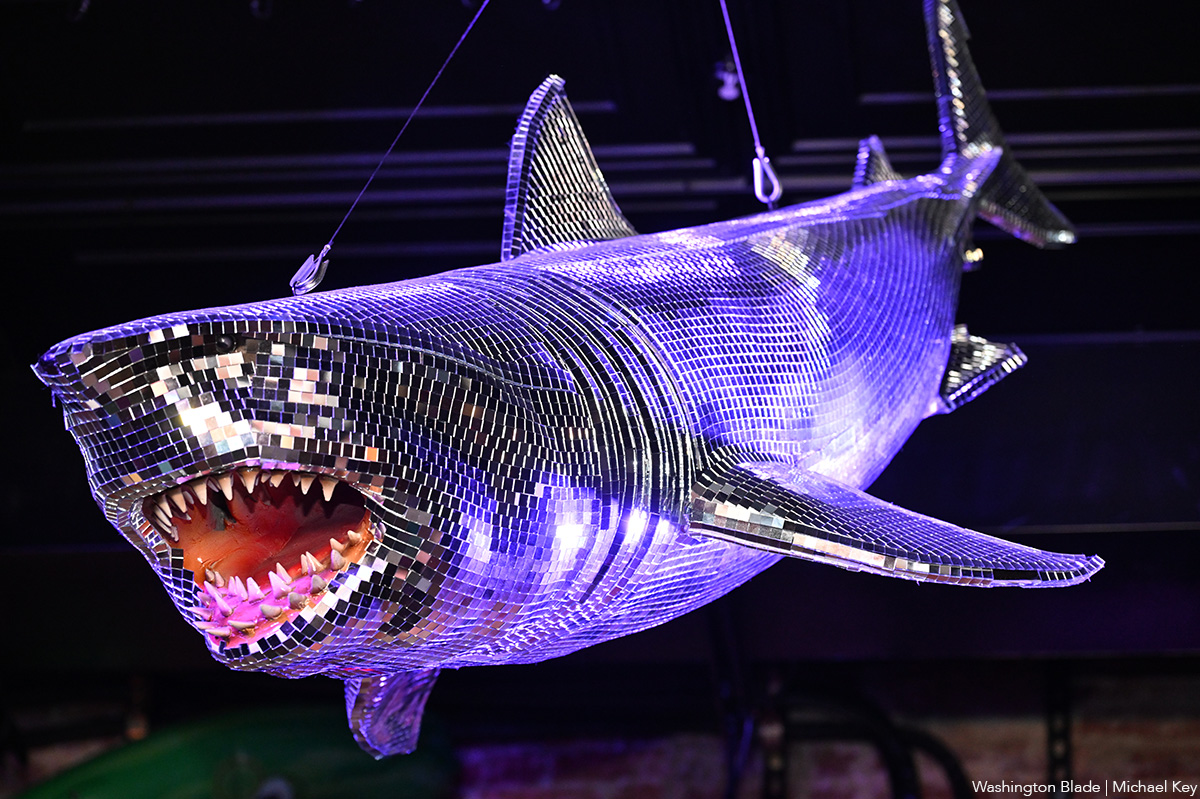
With Christmas in the rear view mirror, we can turn our attention to ringing in a much-anticipated New Year with a slew of local LGBTQ parties. Here’s what’s on tap.
Pitchers
This spacious Adams Morgan bar is hosting the “Pitchers’ Perfect New Year’s Eve.” There will be a midnight Champagne toast, the ball drop on the big screens, and no cover, all night long. The bar doesn’t close until 4 a.m., and the kitchen will be open late (though not until close). All five floors will be open for the party, and party favors are promised.
Trade
D.C.’s hottest bar/club combo is leaning into the Shark motif with its NYE party, “Feeding Frenzy.” The party is a “glitterati-infused Naughty-cal New Year’s Even in the Shark Tank, where the boats are churning and the sharks are circling.” Trade also boasts no cover charge, with doors opening at 5 p.m. and the aforementioned Shark Tank opening at 9 p.m.. Four DJs will be spread across the two spaces; midnight hostess is played by Vagenesis and the two sea sirens sensuously calling are Anathema and Justin Williams.
Number Nine
While Trade will have two DJs as part of one party, Number Nine will host two separate parties, one on each floor. The first floor is classic Number Nine, a more casual-style event with the countdown on TVs and a Champagne midnight toast. There will be no cover and doors open at 5 p.m. Upstairs will be hosted by Capital Sapphics for its second annual NYE gathering. Tickets (about $50) include a midnight Champagne toast, curated drink menu, sapphic DJ set by Rijak, and tarot readings by Yooji.
Crush
Crush will kick off NYE with a free drag bingo at 8 p.m. for the early birds. Post-bingo, there will be a cover for the rest of the evening, featuring two DJs. The cover ($20 limited pre-sale that includes line skip until 11 p.m.; $25 at the door after 9 p.m.) includes one free N/A or Crush, a Champagne toast, and party favors (“the legal kind”). More details on Eventbrite.
Bunker
This subterranean lair is hosting a NYE party entitled “Frosted & Fur: Aspen After Dark New Year’s Eve Celebration.” Arriety from Rupaul Season 15 is set to host, with International DJ Alex Lo. Doors open at 9 p.m. and close at 3 p.m.; there is a midnight Champagne toast. Cover is $25, plus an optional $99 all-you-can-drink package.
District Eagle
This leather-focused bar is hosting “Bulge” for its NYE party. Each District Eagle floor will have its own music and vibe. Doors run from 7 p.m.-3 a.m. and cover is $15. There will be a Champagne toast at midnight, as well as drink specials during the event.
Kiki, Shakiki
Kiki and its new sister bar program Shakiki (in the old Shakers space) will have the same type of party on New Year’s Eve. Both bars open their doors at 5 p.m. and stay open until closing time. Both will offer a Champagne toast at midnight. At Kiki, DJ Vodkatrina will play; at Shakiki, it’ll be DJ Alex Love. Kiki keeps the party going on New Year’s Day, opening at 2 p.m., to celebrate Kiki’s fourth anniversary. There will be a drag show at 6 p.m. and an early 2000s dance party 4-8 p.m.
Spark
This bar and its new menu of alcoholic and twin N/A drinks will host a NYE party with music by DJ Emerald Fox. Given this menu, there will be a complimentary toast at midnight, guests can choose either sparkling wine with or without alcohol. No cover, but Spark is also offering optional wristbands at the door for $35 open bar 11 p.m.-1 a.m. (mid-shelf liquor & all NA drinks).
-

 Photos4 days ago
Photos4 days agoThe year in photos
-

 Sponsored3 days ago
Sponsored3 days agoSafer Ways to Pay for Online Performances and Queer Events
-

 District of Columbia2 days ago
District of Columbia2 days agoTwo pioneering gay journalists to speak at Thursday event
-

 a&e features2 days ago
a&e features2 days agoQueer highlights of the 2026 Critics Choice Awards: Aunt Gladys, that ‘Heated Rivalry’ shoutout and more

